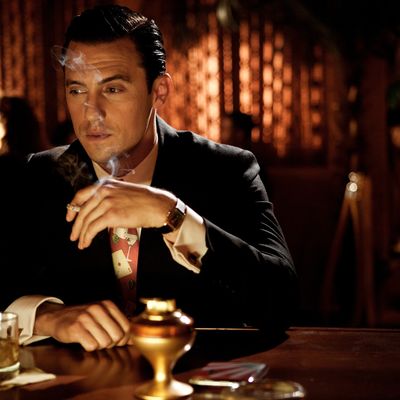
Mob City, a new TNT miniseries set in gangster-ridden Los Angeles following World War II, is produced, written, and directed by Frank Darabont, who seems to have recovered nicely from having been pushed out of (or left)┬áThe Walking Dead in 2011. The six-part drama is based on Jon BuntinÔÇÖs excellent nonfiction book L.A. Noir: The Struggle for the Soul of AmericaÔÇÖs Most Seductive City, but the execution owes more to fantasy than cultural memory. DarabontÔÇÖs City of Angels is an old-movie shadowland: People donÔÇÖt talk so much as they mutter or snarl, and they tend to slouch or pose rather than stand, because just plain standing is dullsville, baby. The butter-and-brass color scheme, the wet streets and smoky nightclubs, and the blatantly Godfather-esque mob hits will be catnip to atmosphere junkies. You could watch with the sound off and still be mildly intrigued, but if you did that, youÔÇÖd miss Mark IshamÔÇÖs old-movie score and his re-orchestrations of old jazz and pop tunes, many of which play out at the showÔÇÖs primary watering hole, BunnyÔÇÖs Jungle Club. If only the characterizations werenÔÇÖt just a couple of notches above an old Dick Tracy comic strip.
Jon Bernthal plays Joe Teague, a decorated war veteran turned L.A. cop. TonightÔÇÖs premiere loops him into an off-duty mission to protect a stand-up comic and Mickey Cohen mob associate named Hecky Nash (Simon Pegg). Nash is involved in a blackmail scheme and fears he might get offed by a couple of important mobsters. JoeÔÇÖs supposed to serve as HeckyÔÇÖs muscle, but thatÔÇÖs not quite how things end up. By the end of episode two, also airing tonight, you may be either pleasantly surprised or deeply irritated by the direction that the show has taken.
I wonÔÇÖt hint at precisely what I mean by that, though, because Mob City, more so than most programs, is relentlessly plot-driven and determined to yank the rug out from under viewers at least once per episode. Anything resembling psychological nuance tends to get squeezed out to make room for elaborately choreographed violence and Greek-chorus-like musical numbers at BunnyÔÇÖs Jungle Club, the showÔÇÖs most important setting outside of police headquarters.
Joe might or might not be totally corrupt; itÔÇÖs hard to tell because heÔÇÖs a strong, silent type, almost as much of a blank slate as Dashiell HammettÔÇÖs Sam Spade. Bernthal brought a young Richard GereÔÇôlike hothead quality to the jealous and brutal Shane on The Walking Dead; you could practically see the bad thoughts roiling around in ShaneÔÇÖs testosterone-fogged mind. In Mob City, he goes in the opposite direction, embracing minimalism and being opaque whenever possible. While IÔÇÖm sure the actor was grateful for the chance to stretch, Clint Eastwood he ainÔÇÖt. Bernthal is watchable but for whatever reason never riveting. He gives the audience so little here that heÔÇÖs nearly impossible to relate to, much less read. He lacks oomph, and lack of oomph is a big problem when youÔÇÖre playing a guy whoÔÇÖs essentially a series of blanks that will slowly be filled in. Darabont and cinematographer David Tattersall (The Green Mile) get tremendous mileage out of the actor as a sculptural object, often shooting his smashed-prow profile in silhouette, but itÔÇÖs not enough to make you think he was the right guy for the role.
Most of the major characters are conceived in similarly singleminded ways. Nash, for instance, is defined purely by his desire to avenge a past grievance, while JoeÔÇÖs superior, Captain William Parker (Neal McDonough, of Boomtown and Justified), is a brawny Boy Scout who wants to stand up against the rising tide of corruption that threatens to engulf the department. Like Bernthal, Pegg and McDonough are cast against type. Pegg, a great Everyman clown whose accent is an integral part of his stardom, is playing a petty and unfunny American here, and not very excitingly, while McDonough, often typecast as hammy villains, is playing an Eliott Ness type. Ancillary roles are filled in similarly counterintuitive ways, with varying degrees of success. For instance, hiring a consummate New York Irish hunk type like Edward Burns to play Jewish mobster and future Las Vegas founder Bugsy Siegel would seem weird even if Burns werenÔÇÖt his typically smooth but dull self.
Mob City is a big-hats-and-tommyguns drama, mixing Boardwalk EmpireÔÇÖs nastiness and James EllroyÔÇÖs paranoid scalawag cool. ItÔÇÖs not as solemn as the former or grimly hip as EllroyÔÇÖs L.A. Confidential (which seems a primary influence). There are times when it takes itself too seriously as modern mythmaking, as if we havenÔÇÖt already seen tales like this before.
But even when the momentum flags or the rhythm seems slightly off, the showÔÇÖs sheer gorgeousness is compelling, and itÔÇÖs clear that Darabont has a vision for this thing, even though we canÔÇÖt deduce every detail based on two episodes. Both the first and second hours of Mob City have a very similar structure, climaxing in a shocking revelation that drives the story onward. Both deploy mob hits, live music performances, and flashbacks to the twenties in a highly ritualistic way, often placing those elements in precisely the same spot in the episodeÔÇÖs narrative. The structure may owe more to fables ÔÇö or to pop music ÔÇö than to standard TV storytelling. IÔÇÖll be coming back to Mob City┬áas it rolls out this month to see where, exactly, theyÔÇÖre taking the story, and because the story is self-contained. Six episodes, case closed.


